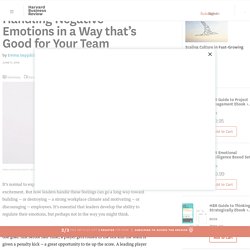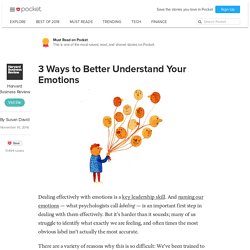

Handling Negative Emotions in a Way that’s Good for Your Team. Executive Summary It’s normal to experience emotions at work: frustration, anger, fear, excitement.

And how leaders handle those feelings can go a long way toward building a strong workplace climate and motivating employees. It’s essential that leaders develop the ability to regulate their emotions, but perhaps not in the way you might think. When you’re upset at work you might be inclined to suppress your feelings to spare your team or to fully express those emotions. But neither approach is ideal. It’s normal to experience emotions at work: frustration, anger, fear, excitement. Take this scenario: A soccer team is playing in a critical game and is down by one goal. The team is upset. Neither, it turns out. Leaders Who Regulate Well, Do Well Research on emotional regulation suggests that the coach’s ability to manage his emotions will determine team morale and motivation.
Suppression is what most people do: hide their feelings and pretend not to feel upset. Unhappiness Is a Palate-Cleanser - Nautilus - Pocket. Happiness, in one form or another, seems to be a common goal that most of us would like to attain.

We often behave as though we might find a route to contentment—comfort, satiety, warmth, or some other reward—and be happy all the time if we could just make the right choices. But pleasure is often fleeting, even from the most appealing experiences, giving rise to ennui and sparking the drive for something new and sensational. As a neuroscientist, I can’t help wondering whether the transience of our satisfaction may not in fact be inescapable and instead may reveal an inevitable aspect of the way the brain works, the understanding of which might provide a clue to how to contend with it. Many moment-to-moment functions of the brain seem so natural that we can hardly distance ourselves enough to reflect upon them: The brain notices.
How do the neurons that compose the brain conduct the business of detecting and analyzing what is happening out there in the world? Indira M. There is a word for the trauma caused by distance from nature. You’ve got problems.

Perhaps more than you know. Apart from all the usual woes—work, relationships, money, time—the civilized life may also be causing you psychological trauma. Disconnection from nature can be bad for our mental health. But there was no name for this particular malaise until Australian sustainability professor Glenn Albrecht coined the term psychoterratic, creating the beginning of a vocabulary to discuss the relationship between mental health and environment.
Since then, he’s thought up a whole lexicon. The healing power of nature Julia Plevin, author of the upcoming book The Healing Magic of Forest Bathing, to be published in March by Random House, understands psychoterratic pain. When she returned to her native San Francisco to work in Silicon Valley, she alighted upon a miracle treatment for her psychological malaise. Plevin is the founder of the San Francisco Forest Bathing Club. ‘Learning to relax can be life-changing’: how to find your comfort zone. How do you like to kick back, chill out and really relax?

This sounds as if it should be a simple question. But I can’t be alone in having spent several evenings over the past couple of weeks slumped on the sofa, “watching TV” while my eyes flicker across Twitter and Facebook, as well as five different WhatsApp groups on my phone. Relaxing is increasingly difficult in our always-on digital world.
This first struck me a couple of years ago when I had to stop exercising after an injury. Exercise had always been my go-to “me-time” activity, and without it I felt totally lost. This seems to be a common problem. The need for some simple source of relaxation can be seen in the initial surge in popularity of the adult colouring book, as well as last year’s 13.3% increase in sales of books providing spiritual guidance on how to live in a hectic world, and the mindfulness “mega trend” seen in Headspace, the meditation app that has been downloaded more than 15m times. 3 Ways to Better Understand Your Emotions - Harvard Business Review - Pocket. Dealing effectively with emotions is a key leadership skill.

And naming our emotions — what psychologists call labeling — is an important first step in dealing with them effectively. But it’s harder than it sounds; many of us struggle to identify what exactly we are feeling, and often times the most obvious label isn’t actually the most accurate. There are a variety of reasons why this is so difficult: We’ve been trained to believe that strong emotions should be suppressed. We have certain (sometimes unspoken) societal and organizational rules against expressing them. Or we’ve never learned a language to accurately describe our emotions. Neena is in a meeting with Jared and the whole time he has been saying things that make her want to explode.
Anger and stress are two of the emotions we see most in the workplace — or at least those are the terms we use for them most frequently.